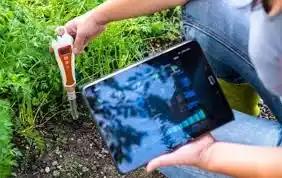The Role of Technology in Sustainable Farming

The world has been witnessing a growing concern for the environment and a heightened emphasis on sustainability across various industries.
The realm of agriculture, a sector critical for feeding the global population, is no exception. Traditional farming practices often involve resource-intensive methods that can lead to soil degradation, water pollution, and high energy consumption.
To address these challenges, technology has emerged as a powerful ally in fostering sustainable agriculture.
In this article explores the pivotal role that technology plays in revolutionizing the agricultural landscape and its potential to create a more environmentally friendly and economically viable future.
Technology-Driven Precision Farming
Precision farming, also known as precision agriculture, is a technological approach that optimizes the efficiency of crop production while minimizing resource waste.
Through the integration of advanced tools like GPS, sensors, drones, and data analytics, farmers can tailor their practices to the unique needs of each section of their fields.
This allows for precise application of water, fertilizers, and pesticides, reducing the overall environmental impact and maximizing yields.
By adopting precision farming techniques, farmers can significantly decrease their reliance on synthetic chemicals and minimize water wastage.
Smart Irrigation Systems
Water scarcity is a pressing concern in many regions around the world. Smart irrigation systems offer a solution by enabling farmers to monitor and control the water supply to their crops with great precision.
These systems utilize real-time data from sensors that measure soil moisture levels, weather conditions, and plant health.
By analyzing this data, farmers can determine the exact amount of water needed, preventing over-irrigation and reducing water consumption.
As a result, smart irrigation not only conserves water but also enhances crop quality and yield.
Data-Driven Decision Making
The abundance of data generated by modern farming technologies has paved the way for data-driven decision-making.
Farmers can leverage this data to gain valuable insights into their operations, leading to improved planning, reduced waste, and increased productivity.
Analyzing historical weather patterns, soil characteristics, and crop growth data enables farmers to make informed choices about planting times, crop varieties, and harvesting techniques.
These insights contribute to resource optimization and sustainable land management.
Vertical Farming and Controlled Environments
As urbanization continues to rise, available arable land becomes scarcer. This challenge has given rise to the concept of vertical farming and controlled environment agriculture.
In vertical farms, crops are cultivated in stacked layers within controlled indoor environments.
By providing the optimal conditions for growth, including light, temperature, and humidity, this approach yields crops faster and with fewer resources.
Vertical farming also reduces the need for long-distance transportation of produce, cutting down on carbon emissions.
FAQs
How does technology help in reducing the environmental impact of agriculture?
Technology enables precision farming practices, allowing farmers to apply resources such as water, fertilizers, and pesticides more efficiently, minimizing waste and environmental harm.
What are smart irrigation systems, and how do they contribute to sustainability?
Smart irrigation systems use real-time data to deliver the right amount of water to crops, preventing over-irrigation, conserving water, and improving crop quality.
How does data-driven decision-making benefit farmers and the environment?
Data-driven decisions based on weather, soil, and crop data lead to optimized farming practices, reduced waste, and increased productivity, promoting sustainable land management.
What is vertical farming, and how does it support sustainable agriculture?
Vertical farming involves growing crops in stacked layers within controlled indoor environments, reducing resource consumption, and minimizing the environmental impact of traditional farming.
Also Read: Transformative Role of Technology in Sustainable Agriculture





